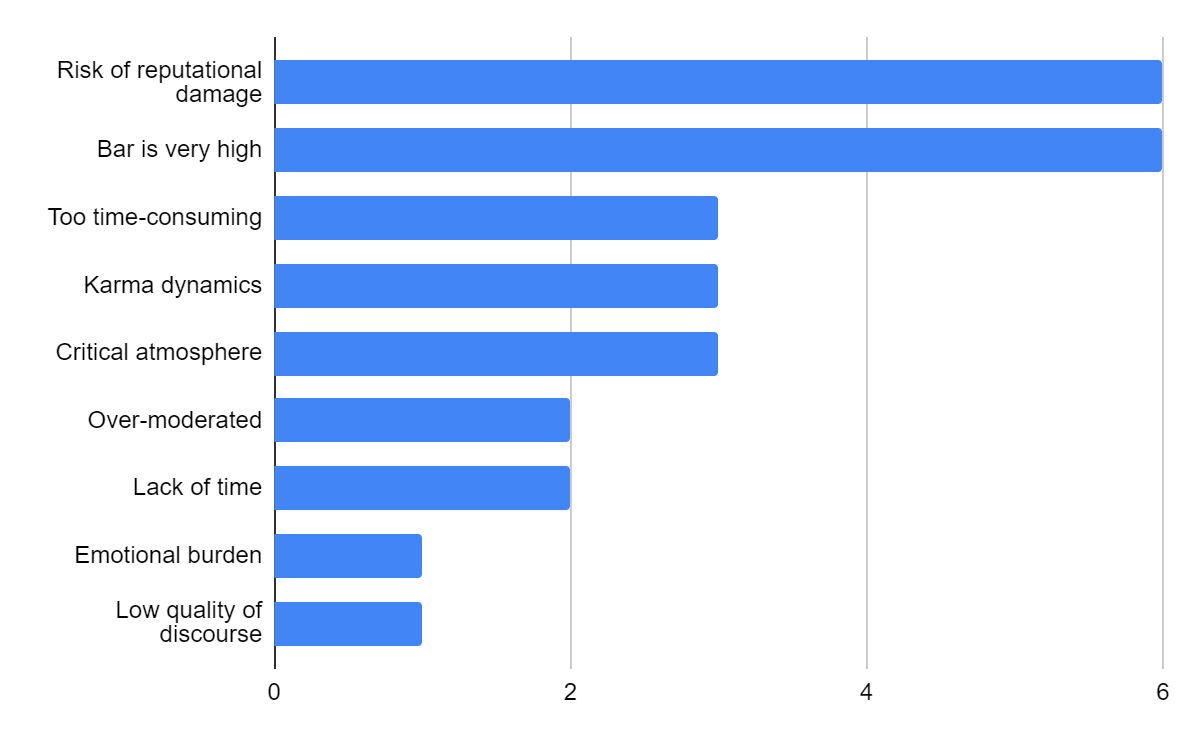I'm anticipating a lot of replies being about how to reduce the aspects of the Forum that make people feel bad about posting, such as harsh criticism, and I think this is good as far as it goes. However I think it's important to think about why people do things as being a balance between costs and benefits, and also think about how we could make the benefits larger or more salient.
"What makes you stop posting?" could be reframed as "What makes you post in the first place?", and "What might make it easier?" could be reframed as "What might make you publish posts that were more challenging for you (practically or emotionally)?"
The quality of many forum posts is very high, including from people who are not paid by a research org to write them and have no direct connection to the community (such as these two). So even if you only factor in the time cost, you would still have to suppose some pretty large benefits to explain why people write them.
I have some ideas about what these benefits are:
- If you see yourself as a temporarily embarrassed academic who has had to get a proper job as a result of economic forces, posting on the EA Forum (or LessWrong) is about as close as you can get to publishing in an academic journal without actually doing that. Your ideas will be taken seriously by a community of people you respect, and you are actually likely to get more substantive engagement than if you were a non-top-tier academic publishing in a non-top-tier journal. This kind of intellectual discussion is exciting to a lot of people, and is reason enough in itself.
- Related to your ideas being taken seriously, they can also steer a community of thousands of people and billions of dollars. It's reasonably common for this to happen, for instance GiveWell changed how they do their cost effectiveness analyses partly as a result of that post by @Froolow that I linked above. There are lots of good examples from LessWrong too, such as Katja Grace's Let's think about slowing down AI which was clearly [citation needed] pivotal in getting that idea recognised as a respectable mainstream position.
- You can get ~material benefits~ from posting on the forum. We have found that a lot of people get jobs at least via, and possibly because of, the Forum. Also it might make people relate to you better at least socially, if not professionally, if you have a couple of good Forum posts explaining your best ideas. For people in largely EA social circles this can be a big benefit.
These are all things that seem like they could be leant on to get people to publish more and better content on the Forum, for instance GiveWell did a Change Our Mind contest which clearly increased the second one.
On the issue of criticism specifically, I am a bit less optimistic about this being a lever to pull to get people to post more. I have written before about why I think reassuring people that they won't be criticised can be wrongheaded. Obviously I think it's good to make sure criticism is of ideas and not people/their values, and to be polite in a common sense way such as trying to give criticism as a compliment sandwich.
But ultimately it's not the bread from a sandwich that people remember, and even being criticised for just your ideas but not your values feels bad to most people. But in order to get the benefit of people taking your ideas seriously they do need to be open to criticism, so I think it's quite difficult to reduce this in practice.
And then on the question of whether reducing "the bad kind of criticism" (i.e. criticism of values/personal attacks) would actually make people post more, one bit of evidence that goes against this is that the posts that get the most engagement tend to be "drama" posts where the comments actually involve proportionately more of "the bad kind of criticism". Obviously there are a lot of confounding factors here but one relevant idea is that "standing up against criticism of your values" can actually feel better/more wholesome than standing up against criticism of your ideas, because if your idea is proven wrong then that's just a bit embarrassing, whereas your values usually can't really be proven wrong.
So anyway, overall I think a better argument to make to try and persuade people to post more is less like "Don't worry you won't be criticised" and more like "It's brave to post on the Forum, for the same reason that it's brave to stand up and talk in front of a group of people. It's brave because you're opening yourself up to the very real downside of being criticised, but there are all these great upsides too, so you might just have to take some of the hits if you want to get them".
And then, from the perspective of people with a community-minded interest in getting more people to post more of their ideas, I think leaning on the benefits side (such as the three things I mentioned) could be at least as effective as leaning on the costs side.
Note: I am a developer on the Forum, but this comment doesn't necessarily represent the views of the whole team

